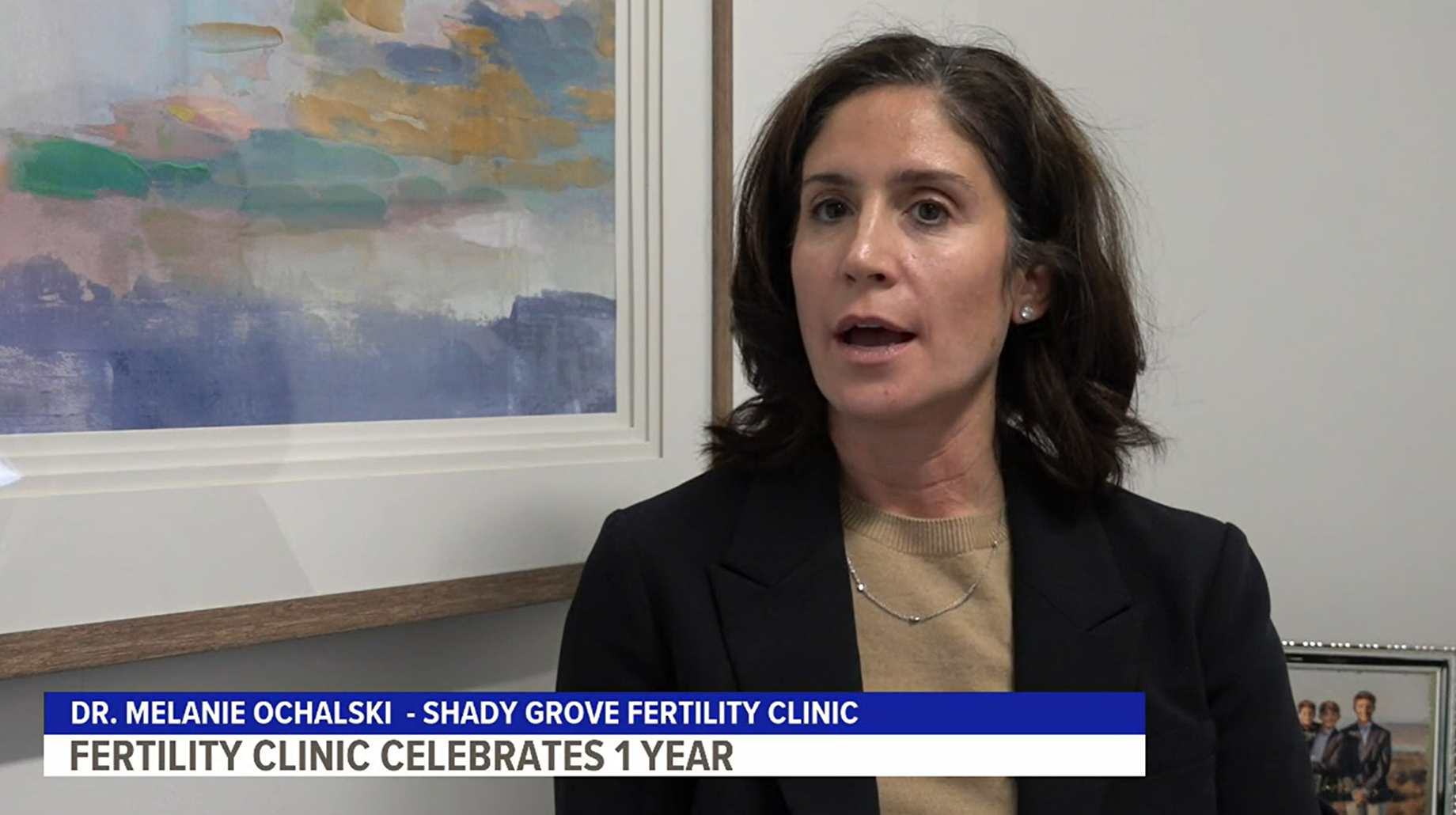Shady Grove Fertility’s Director of Psychological Services, Sharon Covington, joined NPR’s Here & Now podcast to discuss the emotional impact of suffering a miscarriage or miscarriages. Read the transcript below or listen to the interview by clicking the link below.
Listen to the full podcast episode: link
Host: “In 2015, Facebook CEO Mark Zuckerberg announced that he and his wife, Priscilla Chan, had experienced three miscarriages, an admission that led to an outpouring of stories from women and families who had faced the same thing—a public mourning that would have been unthinkable just decades ago. There has been a sea change in the way we as a society mourn miscarriages, which is estimated in one in four pregnancies, and the hopes and dreams that went with them. At one time couples were told things like, “thank goodness you can have another one” or “these things happen for a reason.” In the 1980s, things changed. Couples were encouraged to join support groups, name the child they’d imagined, hold a funeral, maybe even hold the child if it was fully formed to say goodbye. But today, not everyone knows that they can do these things. And our next guest says men in particular aren’t getting the attention they need. Sharon Covington is the Director of Psychological Services at Shady Grove Fertility. Sharon, you say men are the forgotten mourners in a miscarriage. Can you explain that?”
Sharon Covington: “When a pregnancy loss or miscarriage occurs, it typically focuses on the mother and the woman and what she’s going through. They’re frequently put in this role of certainly looking after her, being the strong one, and often being concerned about her health and well-being too.”
Host: “Irving Leon, who’s a psychologist at University of Michigan, says that sometimes men are afraid if they do show their hurt or their sadness, they will bring their wife down.”
Sharon Covington: “I think that’s true. I think that, again, they get in that protector role where they feel that her feelings are what is most paramount and what’s most concerning, so they tend to bury their feelings. In reality, wives often long to hear that their husbands are experiencing the grief and the loss in the same sort of way.”
Host: “Let’s explain a little bit about what we’re talking about because there is some confusion and I have heard people say, ‘oh, how early in the pregnancy was it? Oh, just a few weeks or couple of months? Oh, well then that doesn’t matter.’ That’s so hurtful to parents for whom a miscarriage was shattering. But on the other hand, people who’ve had late pregnancy losses sometimes balk at the notion that it’s the same as an early loss. So, what are we talking about?”
Sharon Covington: “Well, a miscarriage is termed an involuntary loss of a pregnancy before 20 weeks. That being said, I think commonly we think of it before 12 weeks of pregnancy. After 20 weeks of pregnancy, it can either be a preterm birth or a stillbirth. So, people do get the terms confused. In fact, sometimes it can be hurtful for someone who has had a full-term stillbirth and people are calling it a miscarriage because they feel that somehow it minimizes what they went through.”
Host: “On the other hand, when people say others who have an early pregnancy loss after just a month, ‘Oh, it’s a good thing you didn’t get attached. Well, of course she did.’”
Sharon Covington: “Research has shown that the grief can be just as profound early in a pregnancy as it is at birth. Whether it’s early or whether it’s late, it can really have a profound effect. Recently, I was working with a couple and she had multiple miscarriages. By the time they came to me, she had nine miscarriages and they were having a terrible time. In the course of us working together, this last Mother’s Day, she decided that she was going to get a necklace for herself. She got a necklace that had nine little tiny beads on it. She said she didn’t want anything that looked like there were babies or something that would really bring attention to her, but each of those nine little beads reminded her of the babies that she lost.”
Host: “My mother back in her day, women just were told to buck up and move on. I don’t think she ever got over it possibly because she wasn’t allowed to get through it. But to the men – I mean if women feel, and they often do, that somehow their bodies had failed them, what has been your experience with men?”
Sharon Covington: “What happens when they come to either a group or to the counseling, it often just gives them the opportunity to talk about things that they didn’t really feel that they were allowed to talk about.”
Host: “And what were some of their feelings?”
Sharon Covington: “First and foremost, they’re usually concerned about their wife and what their wife is going through and the pain that she is experiencing. When they see her hurting and feel that they can’t make her better, it really increases those feelings of helplessness. That being said, they are also dealing with their own feelings of sadness and loss because they can be equally as attached to the baby into the pregnancy just as she’s experiencing.”
Host: “In the reading, one man said, ‘you know when you lose a dog, people give you a card. Nobody gives you a miscarriage card.’ Although I think it’s a good idea to express your sorrow for someone, but he said you know there’s not a birth or a death certificate in some cases.”
Sharon Covington: “I think in our society, we do a very poor job of helping people grieve and mourn in general. And when it comes to the loss of a pregnancy or a baby at birth, it’s even worse. So, when that person gives the example of not sending cards, well, why don’t we send cards? We really need to help people find socially acceptable avenues for mourning, as we do with other kinds of losses.”
Host: “What are some of the other tools that you give them?”
Sharon Covington: “Well, they want to find something that is going to make this baby real and tangible because there’s really nothing there. I mean they’re left with nothing afterwards. If it’s a later loss, you might be able to have a funeral or a memorial service, but if it’s an earlier loss, you don’t have anything. Another thing that can be very useful and this is something that I do when I’m seeing people in counseling, is to write a letter of goodbye to their baby—to be able to talk about what their hopes and dreams and wishes had been, and about the reasons they need to say goodbye to their baby. Then to take that letter in their hands and to do something with it—take it to a river and let it go downstream. But to do something tangible that allows them to release those words and those feelings.”
Host: “I mean even just saying it is very profound. They could put the letter in a frame—as you say, do something tangible. What else?”
Sharon Covington: “They’ve ended up doing poems, painting pictures. I had a dad one time make a memory box. He worked with his hands real well and had a hard time articulating his feelings. But the idea of making a box that he could somehow put these things into that they had accumulated, like a sonogram picture. If the baby’s a little older, a lock of hair or something like that they could put in there and then they can have it and hold onto it.”
Host: “Well, in particular, again we’re talking about men, addresses that need to do something. You were talking about how men want their partners to feel better and very often, the partner might not want to feel better just yet. You know it’s too soon. How have you seen this impact couples and their relationship?”
Sharon Covington: “The things that I really try to help couples understand, is that as men and women they’re different – they’ve grown up in different families, they had different experiences, and they will feel and deal with this differently. In a relationship, you have to be able to tolerate that and understand it. Now, different doesn’t mean one’s doing better and the other is doing worse. It just means it’s not the same. And so, you have to be able to kind of accept and understand this.”
Host: “Given how powerful this is and how shattering this is, where do you fall on this notion of keeping a pregnancy secret for the first 12 weeks? The thinking was always to get through 3 months and then if everything’s going OK, tell people because you don’t want to have to tell them if things don’t go well. But it seems that leaves people maybe shattered at 2.5 months with a miscarriage and no one knows.”
Sharon Covington: “That’s a hard question to answer because I think it can go either way for people. I have people working in a reproductive medical practice where people are trying desperately to get pregnant and when they do, they want to tell the world. They’re so excited they’ve been waiting for this for so long. And then if they do and then they end up miscarrying, it adds to their sense of failure that they have been dealing with and often they say, ‘gosh, I wish I hadn’t said anything to anyone before.’ So, they share it because they want to share the joy. And it’s so much harder to share in the despair. I think it goes both ways that if people don’t know, they can’t support you. If people do know, then you feel like you’re dealing with their feelings and a sense of shame that is really profound with a pregnancy loss.”
Host: “Certainly something to think about. What’s the best thing to say to someone who has told you? We don’t want to say what was said 50 years ago, which was ‘oh, move on.’”
Sharon Covington: “Well, you don’t want to say anything that’s going to minimize what they have been through. I think the best things to say are things that come straight from the heart. I’m so sorry this must be so hard. I feel so bad. If you’ve experienced it yourself, you can say I know how this feels. Anything that acknowledges and supports the feelings that they have, as opposed to minimizing it or diminishing it. There’s nothing that’s more off putting than that.”
Host: “And for guys too?”
Sharon Covington: “Absolutely for men too. Men will sometimes say they don’t talk about it because it’s too hard to talk about. Because they’re afraid that if they start to talk about it, that their emotions will really come through and they don’t want to look that vulnerable to other people. You know with men, it can be something maybe simpler. Take your buddy out for a beer and sit and say, ‘what’s it like?’ ‘How have you been feeling?’ ‘How’s Sally been feeling?’ You know, make it kind of general, but doing it in a time and place that allows someone to talk. It usually doesn’t work too well if you’re passing in the hallway at work. That’s not a time people want to be vulnerable. The best hope is the help can be done at a time where people can really open up and share those feelings.”
To learn more about Shady Grove Fertility’s Psychological Support Services, click here.
For additional information or to schedule an appointment at Shady Grove Fertility, please contact our New Patient Center at 1-877-971-7755 or click here to complete this brief online form.






